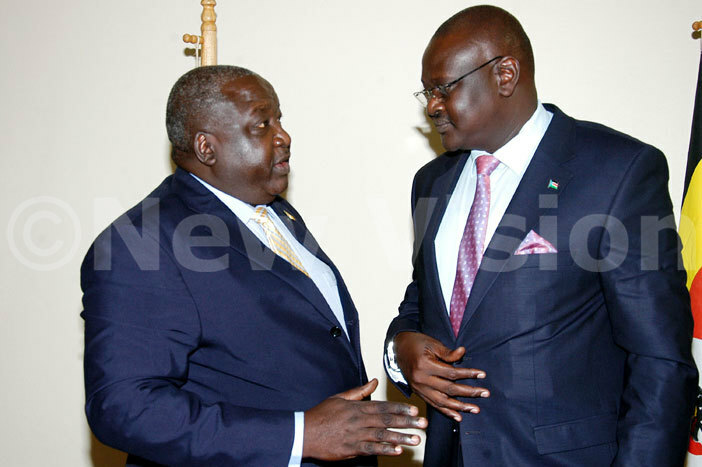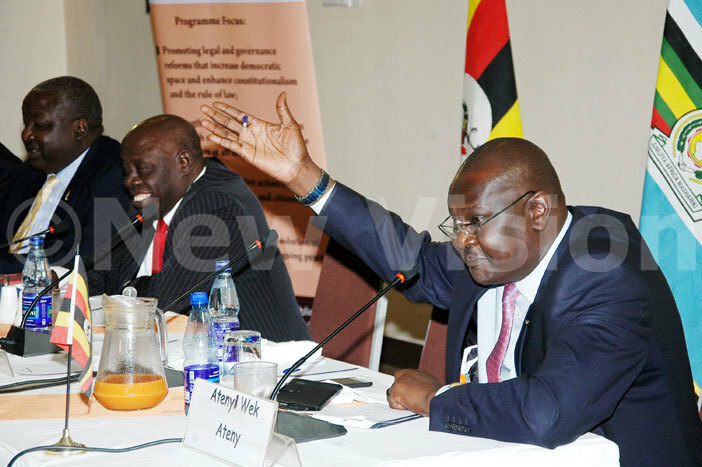Garang must be rolling in his grave, says Oryem
Aug 06, 2016
Garang died in a plane crash in July 2005, the year he became Sudan’s (including Juba and Khartoum) first vice president

Dr. John Garang, the man who led a protracted independence struggle for South Sudanese from Khartoum, must be rolling in his grave because of the political crisis wrecking the country, foreign affairs state minister has said.
South Sudanese voted for independence from Sudan in 2011, but two years later, political differences between President Salva Kiir and vice president Dr. Riek Machar ignited a fresh rebellion in December 2013.
The leadership differences came to a peak in July 2013 when Kiir sacked Machar and the entire cabinet. The former vice president and forces loyal to him staged a coup, but they were overpowered by part of the military backing Kiir and the Ugandan army.
 The State minister for Foreign Affairs, Okello Oryem (left) talks to the Spokesman of the Republic of South Sudan, Ateny Wet Ateny
The State minister for Foreign Affairs, Okello Oryem (left) talks to the Spokesman of the Republic of South Sudan, Ateny Wet Ateny
"Dr. Garang must be angry. What is happening in South Sudan today was not his wish. It is not the wish of thousands of South Sudan," Oryem said, "I condemn the killings, pillaging and rape going on in South Sudan today."
The minister was speaking during a dialogue organized by the Advocates Coalition for Development and Environment (ACODE) to discuss the economic cost of South Sudan conflict on Uganda at Protea hotel in Kampala on Friday.
Garang died in a plane crash in July 2005, the year he became Sudan's (including Juba and Khartoum) first vice president in a power sharing deal ahead of the 2011 historic referendum.
Kiir and Machar signed the Inter-Governmental Authority on Development (IGAD) brokered comprehensive peace agreement in August 2015 to end over two years of fighting that killed hundreds and displaced over two million people.
Kiir was retained as president under the agreement but two positions of vice president were created, with Machar as the first vice president while James Wani Igga is second.
Hardly two months after Machar returned to Juba in April to take up his position, fresh fierce fighting erupted between forces loyal to him and Kiir within the precincts of the presidential compound in the capital Juba on July 8.

The skirmishes between the two forces broke out as Kiir, Machar and Wani were meeting in the president's office to find consensus on the contentious issue of selecting the Speaker of Parliament.
Machar fled Juba in the wake of the fighting and has not yet returned to the capital.
Kiir replaced Machar with Gen. Taban Deng Gai, last week after he was endorsed by Sudan People's Liberation Movement in Opposition (SPLM-IO). Machar has been the leader of the movement.
The South Sudan federal affairs minister, Richard Mulla, said Machar was replaced with a man who led the SPLM-IO negotiation team to salvage the transitional government supposed to last 30 months before the 2018 elections. Mulla belongs to SPLM-IO.
The agreement also provided for the amalgamation of the armies of the two rival leaders in three months.
